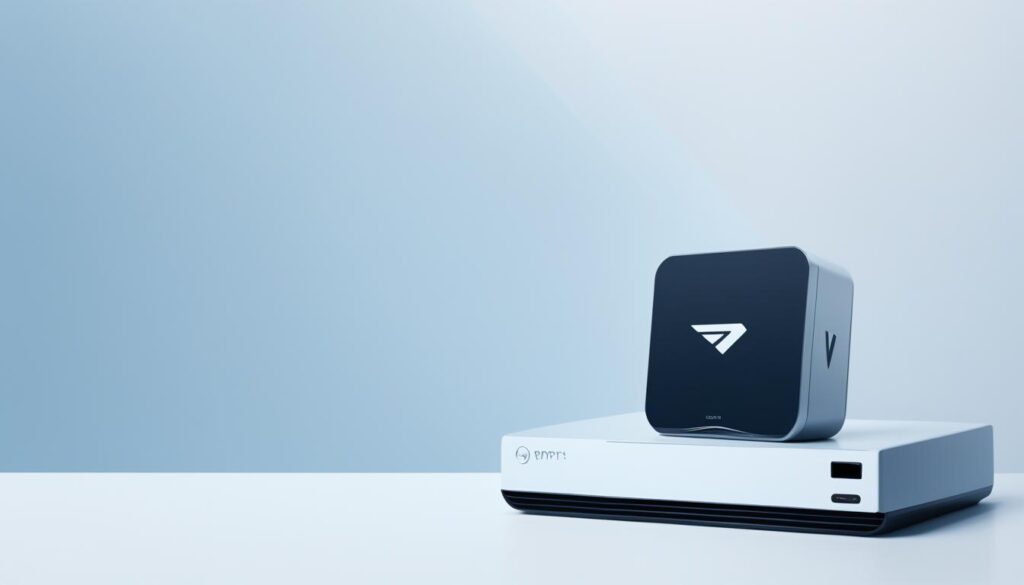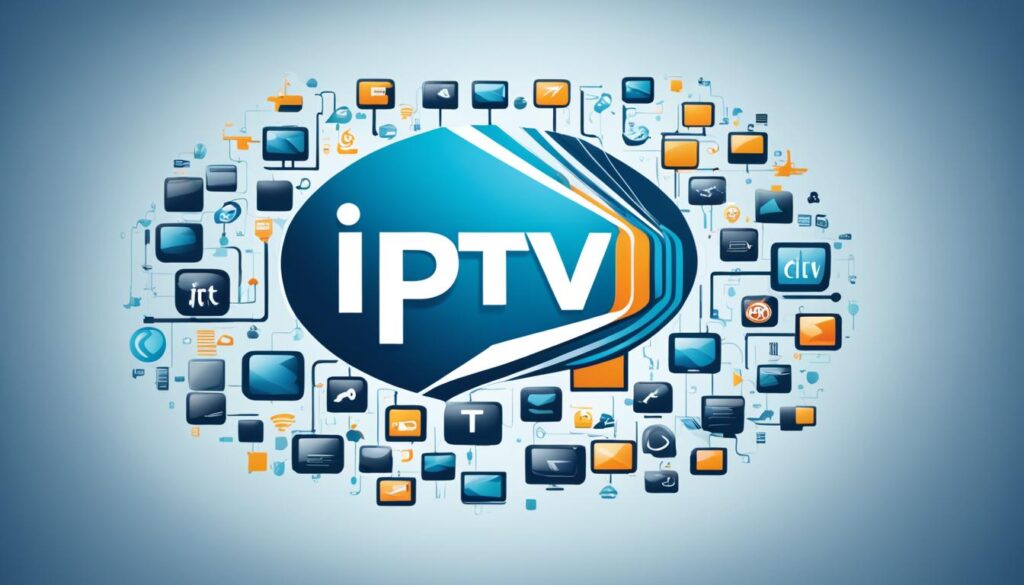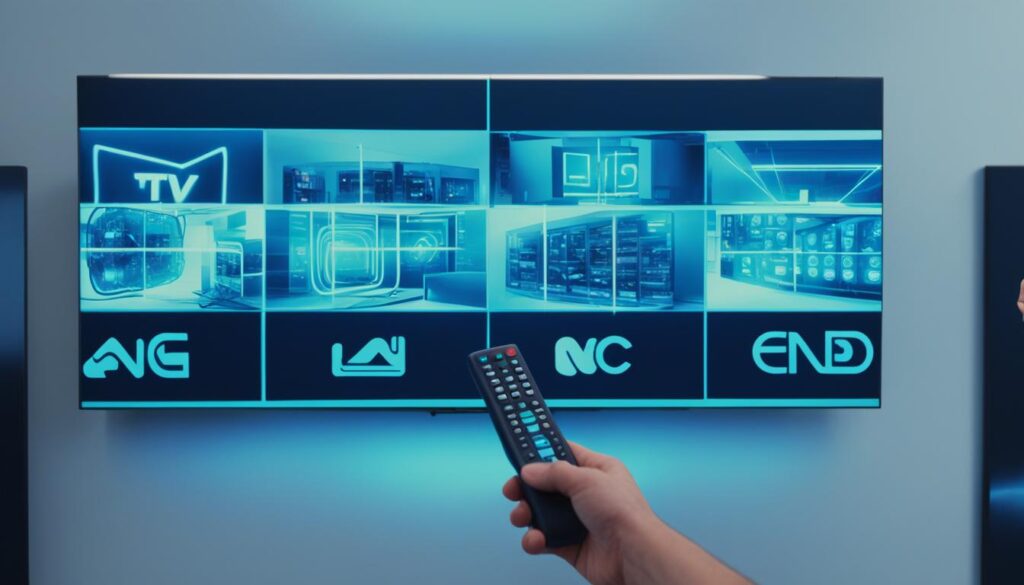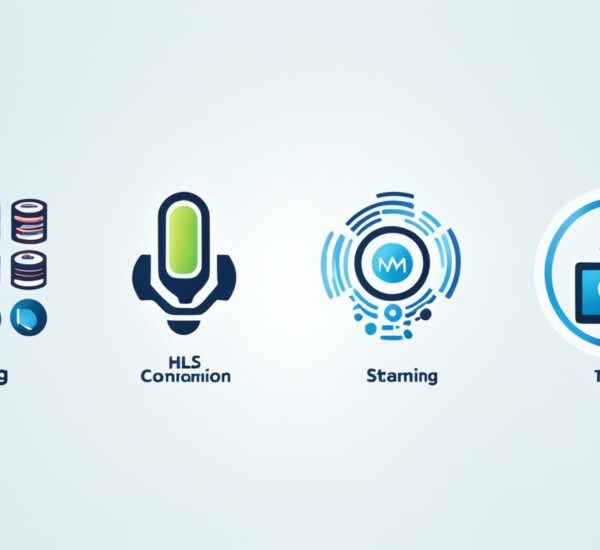Do you know how IPTV (Internet Protocol Television) is changing TV as we know it? The incredible growth of broadband and digital technology is challenging cable and satellite companies. They must fight to keep up with the rise of streaming. IPTV offers viewers new ways to watch TV that are more engaging and interactive.
Now, let’s look at how IPTV is affecting cable providers. We will see how this online TV service could be the thing that changes the game for traditional TV. We’ll talk about how people are watching TV differently and what this means for cable’s future. IPTV is shaking up how TV is delivered, and here’s why.
Key Takeaways:
- IPTV is disrupting the television industry and challenging traditional cable and satellite TV providers.
- It offers an alternative method of distributing television content over the internet.
- IPTV provides opportunities for more immersive, interactive viewing experiences.
- The rise of IPTV is driven by the rapid spread of broadband technology and digital transformation.
- Cable providers must adapt and evolve to stay relevant in the evolving media landscape.
Unveiling the Revolutionary World of IPTV: A Threat to Traditional TV?
The world is changing with Internet Protocol Television (IPTV). Now, TV content can be sent over the internet. People can stream their favorite shows without using traditional ways.
This new idea is challenging how we think of cable and satellite TV. It might even take over from the way traditional TV currently shares shows. IPTV beats regular TV by being more interactive, letting you watch on any device, and accessible worldwide.
The growth of IPTV comes from new tech that has changed the way we watch TV. It gives us a more engaging way to watch with content that’s just for us. You can watch when you want, making IPTV very popular.
Image not displayed on this sample
Adding IPTV to regular TV is shaking up the industry. Companies that use cables and satellites are trying to change to keep up. Even though traditional TV is still big, people’s interest in IPTV is growing. They want to watch in more fun and personal ways, which is a challenge for traditional TV.
The Advantages of IPTV
IPTV has many good things over traditional TV. Let’s look at a few of them:
- Interactivity: IPTV lets people interact with shows through things like menus on the screen, ads that you can click on, and using social media while watching.
- Device Mobility: People can watch their favorite shows on different devices, like phones, tablets, and smart TVs, thanks to IPTV.
- Global Accessibility: You can watch content from all over without needing satellitedish or cable, thanks to IPTV.
- Enhanced Content Options: IPTV has a lot of options, from on-demand movies, TV shows, and live sports.
- Immersive Viewing Experiences: IPTV makes the video and sound quality great, which makes watching more enjoyable.
These benefits show how IPTV is changing TV by being better than traditional TV. It’s making providers change how they do things.
| Traditional TV | IPTV |
|---|---|
| Limited content options | Wide range of content choices |
| Restricted to specific locations | Global accessibility |
| Passive viewing experience | Interactivity and personalized features |
| Fixed broadcast schedules | On-demand streaming and flexible viewing times |
The table above clearly shows how IPTV is winning over traditional TV. It’s leading the way in media and entertainment.
Keep watching for our next section. We’ll see how IPTV is affecting cable and satellite TV providers directly.
Implications on Cable and Satellite TV: Direct Impact of IPTV
IPTV technology is changing the game for cable and satellite TV companies. It forces them to update their services to meet the fast changes in the market. One key change is how IPTV gives power to viewers. They can watch what they want, when they want. This includes pausing, rewinding, or skipping through shows.
This is a big switch from old cable and satellite TV. Past viewers had to watch on set schedules. They had little control. IPTV changes all that. Now, viewers get to decide their viewing time.
With IPTV, there’s also a lot more to watch because of on-demand content. Traditional TV had a fixed set of channels and shows. But IPTV brings huge libraries of movies, shows, and documentaries. Viewers are no longer tied to fixed times. They can watch their favorites whenever they feel like it.
IPTV is also a win for our wallets. Say goodbye to paying for channels you never watch. IPTV lets viewers choose and pay for just the channels they love. This way, people control their spending. They enjoy a cheaper TV experience that suits their tastes!
Moreover, IPTV works on a subscribe-to-view model. Users pay a fee each month or year to enjoy the service. This setup helps keep customers happy. It also creates a steady income for TV companies. Happy viewers stay. They create a strong, loyal fan base for these companies.
All in all, IPTV shakes up cable and satellite TV in a big way. Viewers get control, more to watch, and better prices. To keep up, these traditional providers will need to change. They must add the latest tech like IPTV. And, they should focus on keeping customers happy with new, personalized service.
Note: The image above shows how IPTV is changing the world of cable and satellite TV. It highlights key points like consumer control and on-demand content that define IPTV today.
Repositioning Strategies for Cable and Satellite TV in the IPTV Era
Cable and satellite TV firms face big challenges in today’s market. To keep up, they need to change how they operate. They must use new strategies to keep their customers and find new ones.
Embracing Innovation with a Hybrid Model
Using both traditional TV and IPTV is a smart move. It can make watching TV a lot more fun. This mix lets viewers choose what they want to watch and when. It makes TV more interactive and personalized for everyone.
Implementing Value-Based Pricing
Changing how TV is priced is a must now. Instead of paying for a set of channels, people could pay for just what they watch. This means customers get more choice and can save money. It’s a win for both the TV providers and the viewers.
Building Strong Customer Relationships
Making customers feel special is now a top priority. It isn’t just about what’s on TV anymore. It’s about offering services that feel like they’re made just for you. This keeps people coming back and telling others about the great service.

Redefining Television: IPTV a Powerful Disruptor or Complementary Force?
IPTV has stirred up talks on whether it will change TV as we know it or get along with cable and satellite TV. It offers unique features and benefits that could shake up how we watch TV.
IPTV changes the game by letting users pick what they watch and when they watch it. This puts an end to missing out on shows because they don’t fit your schedule. Viewers can now watch their top picks any time they like.
IPTV works on more than just your TV. You can tune in using your phone, tablet, or computer. This is great for people who love gadgets and want to watch shows wherever they are.
One big plus of IPTV is better picture quality. Thanks to improved streaming and fast internet, watching TV has never looked so good. This means more detail and clearer images for viewers.
IPTV also knocks down location walls, giving viewers access to global content. Whether it’s shows from the other side of the world or local favorites, the options are almost limitless. This is a win for anyone with diverse tastes.
Although IPTV is making its mark, traditional TV still fits many people’s needs. In places without great internet or where cable and satellite TV are strong, they remain a trusted source of entertainment.
The TV of the future will likely be a mix of both IPTV and traditional TV. This blend will ensure viewers get the content they want, whether it’s the endless choices IPTV offers or the reliability of cable and satellite TV.
IPTV is changing TV for the better with its personalization, device variety, superior picture, and global content. It’s making us rethink how we watch and enjoy TV. The way things are going, it’s set to play a big role in the TV scene ahead.
What is IPTV (Internet Protocol Television)?
IPTV stands for Internet Protocol Television. It delivers TV content over the internet. People can watch TV shows and movies using their internet connection. This lets viewers watch what they like, when they like. They can also use different devices, like phones and tablets, to watch TV.
Unlike regular TV, IPTV uses the internet to send content. This means no cables or satellites are needed. It makes watching TV easier and more flexible. With IPTV, viewers have lots of shows and movies to pick from.
IPTV is great for catching up on shows or finding new ones. It offers a wide variety of entertainment, from sports to documentaries. IPTV has changed how we watch TV by using fast internet and on-demand content.

Who is IPTV for?
IPTV serves many people. It’s perfect for those who love sports, travel the world, families, film buffs, and tech lovers. There’s something for everyone with IPTV.
Sports Enthusiasts
For those into sports, IPTV is a game changer. It beams live games to your screen. Now you can watch every thrilling moment as it happens, without delay.
International Viewers
IPTV’s global reach lets you access content from around the world. This means you can watch TV shows and movies from any country. The world is your entertainment oyster with IPTV.
Families
Families love IPTV for its multiple device viewing. No more fights over the TV. Everyone can watch what they like, when they like. It’s perfect for movie nights or catching up on shows together.
Movie Fans
Movie buffs find IPTV a treasure trove. It offers endless movies at your fingertips. Watch what you want, when you want. It’s like having your personal cinema.
Tech-Savvy Individuals
Tech fans are drawn to IPTV for its cutting-edge features. It offers the latest in streaming technology. Watching TV becomes an entirely new, interactive, and top-quality experience.
| Audience | IPTV Benefits |
|---|---|
| Sports Enthusiasts | Live video streaming of games and matches |
| International Viewers | Access to global content |
| Families | Multi-device access for harmonious TV time |
| Movie Fans | Convenience of video-on-demand platforms |
| Tech-Savvy Individuals | Advanced features and benefits |
How does IPTV Work?
IPTV stands for Internet Protocol Television. To get how it works, think of TV content turning into digital packets. These are then saved on servers.
When you pick a show, the service finds those packets and sends them to you. This is how you watch without any delays.
The process of delivering shows and movies is important for IPTV. It turns these into packets and keeps them on servers. That way, you get to watch what you want, when you want.
IPTV is cool because it meets what you specifically ask for. Want to watch something not on schedule? IPTV lets you do that. You can also pause, rewind, or skip parts of shows. This makes TV watching more personal and interactive than before.

Server Technology: Driving IPTV
IPTV needs strong servers to work. These servers handle your requests and send you the right packets. They help make your watching experience smooth and without glitches.
Efficient Content Delivery through IP Packets
IP packets are at the heart of IPTV’s service. These packets hold video, audio, and more. By sending information in small bits, IPTV makes sure you see your shows without any trouble.
Streaming On-Demand and Personalized Content
With IPTV, you can pick what you want to watch, anytime. You’re not stuck with TV schedules. Plus, you get to personalize your watching with custom playlists.
The User Interface: Connecting Content and Viewers
IPTV uses easy-to-use screens to help you find what you want to watch. It’s all about making it simple for you to pick and enjoy your shows.
| Advantages of IPTV’s Content Delivery System | Disadvantages of Traditional TV Delivery |
|---|---|
|
|
IPTV changes how we watch TV. It offers flexibility and fun by letting you choose what to watch. This technology makes TV more enjoyable and interactive for everyone.
What Is an IPTV Box?
An IPTV box turns online signals into something TVs can show. It connects the internet TV to your regular TV. This way, you can watch internet TV in the same way on your TV at home.
The IPTV box takes the online TV signals and changes them. It makes them TV-friendly. So, you can watch these shows on your TV screen.
IPTV boxes use different ways to connect to your TV. This includes:
- HDMI cables: They offer the best way to connect the IPTV box to your TV. This gives you the best image and sound quality.
- AV cables: These are for older TVs without HDMI. They make sure the box can still work with them.
- Wi-Fi: For a cable-free connection between the box and your TV. This makes where you put the box more flexible.
- PC mirroring: You can show the IPTV box on your computer. Then, connect your computer to the TV. It offers both IPTV’s ease and a large TV screen.
With many ways to connect, IPTV boxes fit everyone’s needs. They make watching IPTV smooth and fun for everyone.
IPTV Box Connection Methods
| Connection Method | Advantages |
|---|---|
| HDMI cables | High-definition video and audio quality, simple and reliable connection |
| AV cables | Compatibility with older TV models |
| Wi-Fi | Wireless connection, flexibility in device placement |
| PC mirroring | Combining the convenience of IPTV with a larger TV screen |
The IPTV box brings internet TV to regular TVs. It opens up a world of entertainment. Now, viewers can personalize their TV viewing like never before.
Hybrid IPTV
Hybrid IPTV mixes traditional TV with IP-based TV, creating a richer experience for viewers. It joins regular channels with IP services. This makes streaming smoother and more reliable. It’s a win-win, connecting TV as we know it with new ways to watch.
This setup gives the best of both worlds to watchers. You get your usual cable fix and the cool benefits of streaming. So, catch your sports live or see the newest show episodes with ease. It’s a super flexible and sweet entertainment package.
The magic is in mixing broadcast TV with online content. This lets you jump from live to streaming effortlessly. The result? A world of varied shows and movies, all in one place.
Plus, hybrid IPTV means no more annoyed buffering or low-quality videos. Quality’s up, interruptions are down. Time to binge-watch without a care, boosting your watching mood.
Benefits of Hybrid IPTV:
- Access to a wide range of content: With hybrid IPTV, viewers can enjoy traditional cable channels, on-demand streaming services, and even personalized recommendations.
- Enhanced viewing experience: The combination of traditional TV broadcasts and IP-based services offers a seamless and immersive entertainment solution.
- Convenience and flexibility: Viewers have the freedom to choose what they want to watch, whether it’s live programming or on-demand content.
- Improved video quality: Hybrid IPTV ensures a consistent and reliable streaming experience with minimal buffering and high-definition video playback.
- Single-box solution: No need for multiple devices or subscriptions. Hybrid IPTV provides a unified platform for accessing a variety of content.

| Traditional TV | Hybrid IPTV |
|---|---|
| Limited channels | Wide range of channels |
| Fixed schedule | On-demand and live programming |
| No interactive features | Interactive advertisements and personalized recommendations |
| Dependent on cable or satellite signal | Relies on internet connectivity |
Future Potential of IPTV
The future looks bright for IPTV due to new tech and endless industry innovation. The way we watch shows and movies is about to change big time. What we know as TV will be turned upside down.
5G Integration: Enhancing Streaming Quality and Reliability
Bringing in 5G will really shake things up for IPTV. It will mean super-fast speeds and nearly no delay. This combo will make shows run smoother, look better, with less waiting or buffering.
Artificial Intelligence and Machine Learning: Personalized Viewing Experiences and Content Curation
AI and ML are set to create shows and movies just for you. They’ll learn what you like and how you watch. This means more excitement and choices during your watch time.
Virtual Reality and Augmented Reality: Immersive Viewing Experiences
Soon, you might step into the shows you love using VR and AR. Imagine feeling like you’re right in the movie or at a big game. These technologies will totally change how you see TV.
Interactive Features: Social Media Integration and Real-Time Viewer Engagement
IPTV will become a place to watch and chat with friends about what you’re seeing. It’ll be like hanging out but through your TV. Also, fun games and voting will make watching more fun and personal.
The journey ahead in IPTV is full of new ideas and tech. With 5G, AI, VR, and cool ways to get involved, TV will become something totally different. It’s all about making shows and movies personal and immersive for everyone everywhere.
Conclusion
IPTV has changed how we watch TV. It brings many benefits like more shows to choose from, watching on any device, and interacting with what we watch. This makes it a key player in TV today.
Despite challenges like rules and other TV options, the future of IPTV looks bright. New technology like fast 5G, artificial intelligence, and virtual reality means we’re in for exciting times. These will make watching TV even more personal and fun.
IPTV is shaping where TV is going. It’s already made big changes and is set to do more. This means we can expect better shows, different ways to watch, and more fun features. Companies that use IPTV well will be the ones we stick with in the future.



